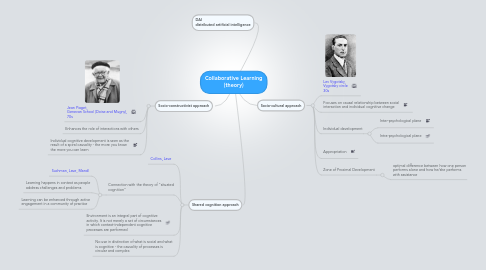Collaborative Learning (theory)
저자: Polina Grigoreva


1. Socio-constructivist approach
1.1. Jean Piaget, Genevan School (Doise and Mugny), 70s
1.2. Enhances the role of interactions with others
1.3. Individual cognitive development is seen as the result of a spiral causality - the more you know the more you can learn
2. Shared cognition approach
2.1. Collins, Lave
2.2. Connection with the theory of "situated cognition"
2.2.1. Suchman, Lave, Mandl
2.2.2. Learning happens in context as people address challenges and problems
2.2.3. Learning can be enhanced through active engagement in a community of practice
2.3. Environment is an integral part of cognitive activity. It is not merely a set of circumstances in which context-independent cognitive processes are performed
2.4. No use in distinction of what is social and what is cognitive - the causality of processes is circular and complex
3. DAI distributed artificial intelligence
4. Socio-cultural approach
4.1. Lev Vygotsky, Vygotsky circle 30s
4.2. Focuses on causal relationship between social interaction and individual cognitive change
4.3. Individual development
4.3.1. Inter-psychological plane
4.3.2. Intra-psychological plane
4.4. Appropriation
4.5. Zone of Proximal Development
4.5.1. optimal difference between how one person performs alone and how he/she performs with assistance
